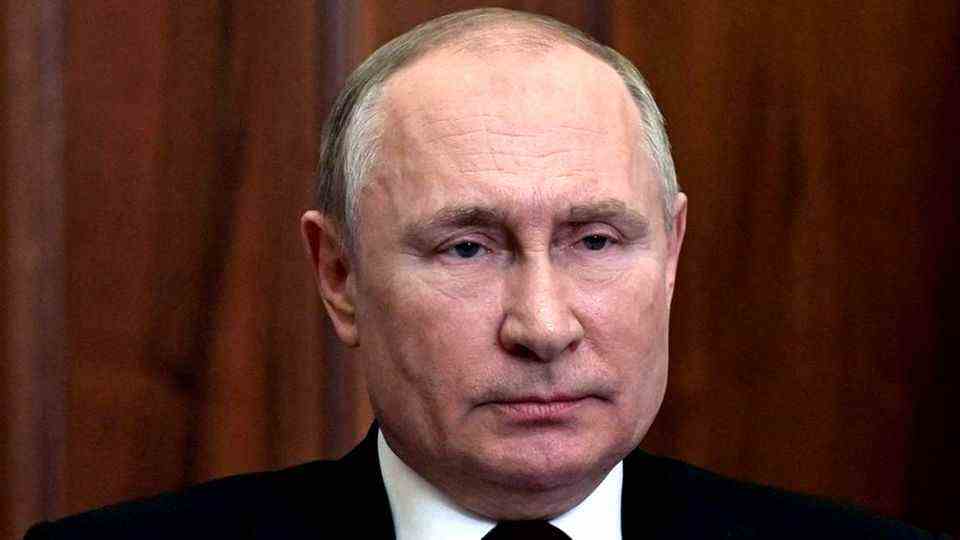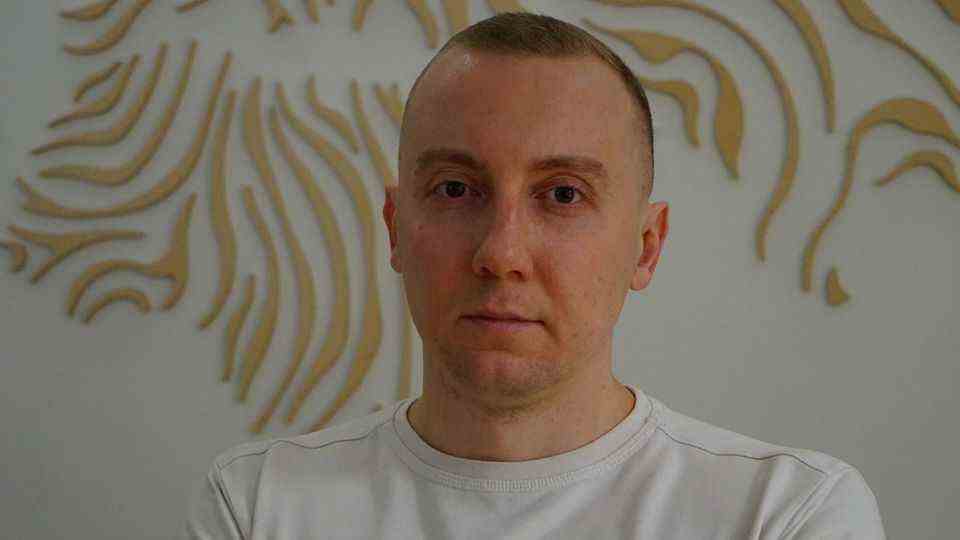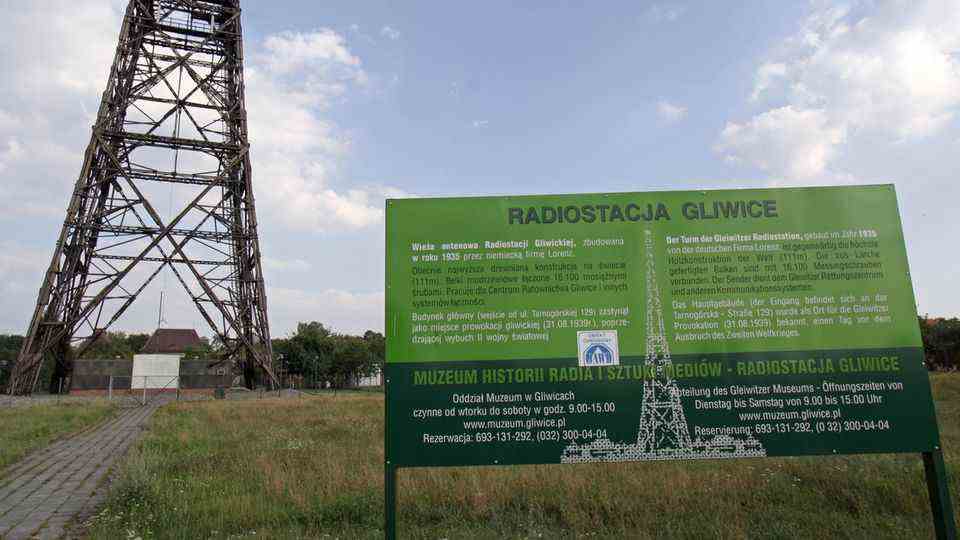What does Vladimir Putin want? Perhaps the Kremlin boss doesn’t even know that himself (yet). He doesn’t have to, because he can use missing answers as a weapon against the West.
Is this already war? The invasion of Ukraine, which Western intelligence services have repeatedly announced? Or “just” a preliminary stage? Part I of II, III, IV? Or is what is happening in the border region the foreseeable takeover of the already “lost” separatist areas by Russia? An act of ultra-real politics, so to speak. And what are Vladimir Putin’s “peacekeeping troops” doing in the “people’s republics” of Luhansk and Donetsk that he recognizes? care for peace? Or are the areas staging areas for more Russian soldiers who will be planning the next piece of Ukraine next week, next month, in the next few years?
“Hateful Lecture by the President”
The speech in which Putin explained the recognition of the separatist areas left no conclusion as to whether this step is the end of his grip on Ukraine, an intermediate step or just the beginning. “In some parts it sounded as if he was about to announce an invasion, a march through to Kiev – the president’s speech sounded so hateful,” writes star-Russia expert Bettina Sengling. But also: “It wasn’t a declaration of war on Ukraine. With luck, the recognition could even mean the end of the conflict. Putin would have won a victory – without war. ‘He could withdraw the troops and save face,’ judges the political scientist Ekaterina Schulman.”
Very possible. But anyone who looks at Putin’s thoughts about the neighboring state could also come to the conclusion that he understands Ukraine’s western orientation as an insult to Russia and thus as an insult to himself. The President has repeatedly explained why Ukraine not only cannot be an independent country, the Ukrainians are not even a brother nation, but actually Russians, i.e. a part of Russia and thus in a certain way of himself. Anyone who formulates his property claims so clearly, almost forces himself to have to redeem them at some point.

Watch the video: Is Russia’s strategy finally clear now? star expert classifies bizarre Putin speech.
The question is what Vladimir Putin wants. Kremlin astrologers have been puzzling over the Russian head of state’s plans and deliberations for ages. Presumably, the constant guesswork of the West gives him a thieving pleasure. The vague and uncertain, both and perhaps, is the world in which Putin is most comfortable. But there are a few clues as to his possible plans, so here’s a (slightly bold) prediction.
Vladimir Putin has 14 years left
The Russian Duma approved Putin for a few more terms last spring, and he can remain president until 2036. Then he would be 83 years old, which need not be a reason for Kremlin bosses to retire. So he still has 14 years to shape his political legacy. Quite a few observers believe that Putin dreams of handing his successor a kind of Greater Russia, of which not only Ukraine is a part. In his historical essay from last year, there is a passage about the “triune people”. According to this tsarist-era concept, Russians, Ukrainians and Belarusians are three parts of a nation longing for unification. Belarus is already on Moscow’s side, and Moscow’s troops are already in Belarus.
While Putin has said he has no plans to build an empire, his credibility is now near zero. Other, earlier parts of the monarchy and the Soviet Union may be lost to the Kremlin, but at least some, such as Kazakhstan, have remained close allies. In the Caucasus, too, there are two regions, South Ossetia and Abkhazia, which, like the Donbas, depend on Russia’s drip but are not internationally recognized as separate states. They split from Georgia in 2008.
But although in eastern Ukraine people have been paying with Russian rubles instead of Ukrainian hryvnia for years, meaning that the area is de facto Russian-dominated, Bettina Sengling points out that the incorporation of Luhansk and Donetsk might not go entirely smoothly. Because the people’s republics of the separatists only cover around a third of the administrative areas around Donetsk and Luhansk, according to the stern reporter. This means that the conquered area would have to be expanded considerably, i.e. the Russian military would invade the Ukrainian part of the Donbas. “Putin deliberately left this variant open in the speech,” writes Sengling.
Is Russia taking Ukraine bit by bit?
It took eight years to forcibly separate the Donbas from Ukraine, supported by Moscow. It will probably also take some time to bring the rest of eastern Ukraine into line. If Vladimir Putin sticks to his penchant for deploying military operations around the Olympic Games, like in 2008, 2014 and 2022, then he could take the next steps against Ukraine in the summer of 2024. Or even two years later. Instead of engaging fully in an unpredictable, bloody and costly confrontation with its neighbor now and fully, Moscow is simply appropriating Ukraine piece by piece. As I said, the head of the Kremlin still has time.
Admittedly, the scenario is speculation. It is also possible that Putin will leave his troops in eastern Ukraine and end his aggression. But that is probably just as unlikely as a (soon) complete invasion of the country. Presumably, it will result in a hybrid-led ongoing conflict: with cyber attacks, disinformation campaigns, occasional acts of violence, turning off the gas tap and supporting Ukrainians who are critical of the regime and loyal to Moscow. In short: a slow and painful wearing down of Ukrainian statehood.
But perhaps there is no answer at all to the question of what Putin wants. Because he doesn’t need an answer. Instead, he uses uncertainty as a weapon. Uncertainty about military operations. insecurity in the US. insecurity in NATO. insecurity in Eastern Europe. Uncertainty about the energy supply, uncertainty about truth and lies. Uncertainty about war and peace. For the Russian President, the great guesswork is a lever with which he can adjust the level of panic and unrest in the West up and down at will. No answers are his solution, not the problem.
Also read about the conflict in Eastern Europe:
Always trouble with the ex (partial republic) – Russia’s conflicts with its neighbors
Reactions to Putin decision: China for restraint, Turkey criticizes Russia
Zelenskyi: Don’t think there will be war against Ukraine (video)
swell: DPA, AFP, Deutschlandfunk“The New Zurich Times“



